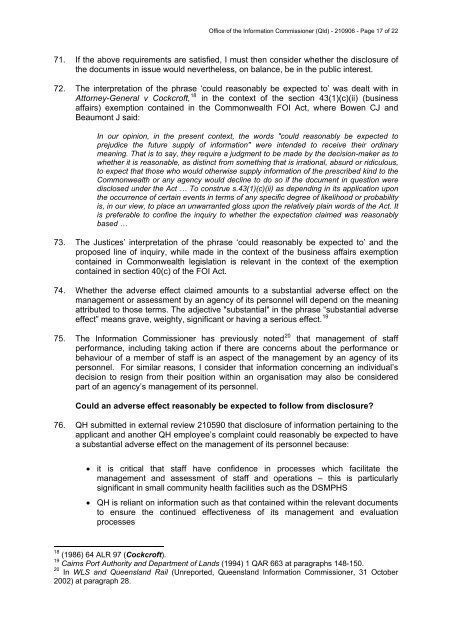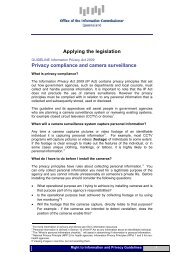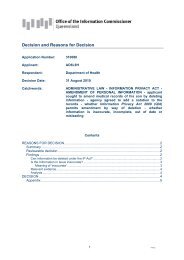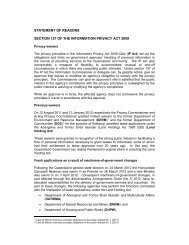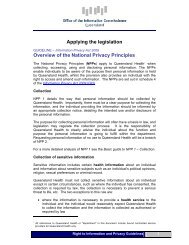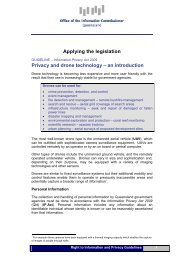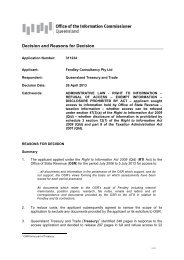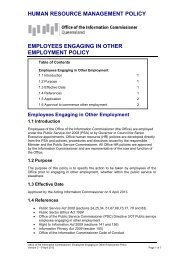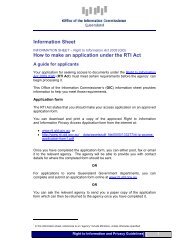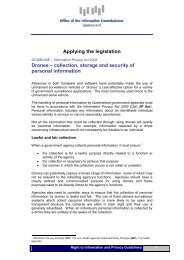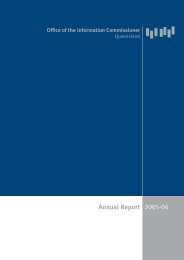Decision and Reasons for Decision - Office of the Information ...
Decision and Reasons for Decision - Office of the Information ...
Decision and Reasons for Decision - Office of the Information ...
You also want an ePaper? Increase the reach of your titles
YUMPU automatically turns print PDFs into web optimized ePapers that Google loves.
<strong>Office</strong> <strong>of</strong> <strong>the</strong> In<strong>for</strong>mation Commissioner (Qld) - 210906 - Page 17 <strong>of</strong> 22<br />
71. If <strong>the</strong> above requirements are satisfied, I must <strong>the</strong>n consider whe<strong>the</strong>r <strong>the</strong> disclosure <strong>of</strong><br />
<strong>the</strong> documents in issue would never<strong>the</strong>less, on balance, be in <strong>the</strong> public interest.<br />
72. The interpretation <strong>of</strong> <strong>the</strong> phrase ‘could reasonably be expected to’ was dealt with in<br />
Attorney-General v Cockcr<strong>of</strong>t, 18 in <strong>the</strong> context <strong>of</strong> <strong>the</strong> section 43(1)(c)(ii) (business<br />
affairs) exemption contained in <strong>the</strong> Commonwealth FOI Act, where Bowen CJ <strong>and</strong><br />
Beaumont J said:<br />
In our opinion, in <strong>the</strong> present context, <strong>the</strong> words "could reasonably be expected to<br />
prejudice <strong>the</strong> future supply <strong>of</strong> in<strong>for</strong>mation" were intended to receive <strong>the</strong>ir ordinary<br />
meaning. That is to say, <strong>the</strong>y require a judgment to be made by <strong>the</strong> decision-maker as to<br />
whe<strong>the</strong>r it is reasonable, as distinct from something that is irrational, absurd or ridiculous,<br />
to expect that those who would o<strong>the</strong>rwise supply in<strong>for</strong>mation <strong>of</strong> <strong>the</strong> prescribed kind to <strong>the</strong><br />
Commonwealth or any agency would decline to do so if <strong>the</strong> document in question were<br />
disclosed under <strong>the</strong> Act … To construe s.43(1)(c)(ii) as depending in its application upon<br />
<strong>the</strong> occurrence <strong>of</strong> certain events in terms <strong>of</strong> any specific degree <strong>of</strong> likelihood or probability<br />
is, in our view, to place an unwarranted gloss upon <strong>the</strong> relatively plain words <strong>of</strong> <strong>the</strong> Act. It<br />
is preferable to confine <strong>the</strong> inquiry to whe<strong>the</strong>r <strong>the</strong> expectation claimed was reasonably<br />
based …<br />
73. The Justices’ interpretation <strong>of</strong> <strong>the</strong> phrase ‘could reasonably be expected to’ <strong>and</strong> <strong>the</strong><br />
proposed line <strong>of</strong> inquiry, while made in <strong>the</strong> context <strong>of</strong> <strong>the</strong> business affairs exemption<br />
contained in Commonwealth legislation is relevant in <strong>the</strong> context <strong>of</strong> <strong>the</strong> exemption<br />
contained in section 40(c) <strong>of</strong> <strong>the</strong> FOI Act.<br />
74. Whe<strong>the</strong>r <strong>the</strong> adverse effect claimed amounts to a substantial adverse effect on <strong>the</strong><br />
management or assessment by an agency <strong>of</strong> its personnel will depend on <strong>the</strong> meaning<br />
attributed to those terms. The adjective "substantial" in <strong>the</strong> phrase “substantial adverse<br />
effect” means grave, weighty, significant or having a serious effect. 19<br />
75. The In<strong>for</strong>mation Commissioner has previously noted 20 that management <strong>of</strong> staff<br />
per<strong>for</strong>mance, including taking action if <strong>the</strong>re are concerns about <strong>the</strong> per<strong>for</strong>mance or<br />
behaviour <strong>of</strong> a member <strong>of</strong> staff is an aspect <strong>of</strong> <strong>the</strong> management by an agency <strong>of</strong> its<br />
personnel. For similar reasons, I consider that in<strong>for</strong>mation concerning an individual’s<br />
decision to resign from <strong>the</strong>ir position within an organisation may also be considered<br />
part <strong>of</strong> an agency’s management <strong>of</strong> its personnel.<br />
Could an adverse effect reasonably be expected to follow from disclosure?<br />
76. QH submitted in external review 210590 that disclosure <strong>of</strong> in<strong>for</strong>mation pertaining to <strong>the</strong><br />
applicant <strong>and</strong> ano<strong>the</strong>r QH employee’s complaint could reasonably be expected to have<br />
a substantial adverse effect on <strong>the</strong> management <strong>of</strong> its personnel because:<br />
• it is critical that staff have confidence in processes which facilitate <strong>the</strong><br />
management <strong>and</strong> assessment <strong>of</strong> staff <strong>and</strong> operations – this is particularly<br />
significant in small community health facilities such as <strong>the</strong> DSMPHS<br />
• QH is reliant on in<strong>for</strong>mation such as that contained within <strong>the</strong> relevant documents<br />
to ensure <strong>the</strong> continued effectiveness <strong>of</strong> its management <strong>and</strong> evaluation<br />
processes<br />
18 (1986) 64 ALR 97 (Cockcr<strong>of</strong>t).<br />
19 Cairns Port Authority <strong>and</strong> Department <strong>of</strong> L<strong>and</strong>s (1994) 1 QAR 663 at paragraphs 148-150.<br />
20 In WLS <strong>and</strong> Queensl<strong>and</strong> Rail (Unreported, Queensl<strong>and</strong> In<strong>for</strong>mation Commissioner, 31 October<br />
2002) at paragraph 28.


